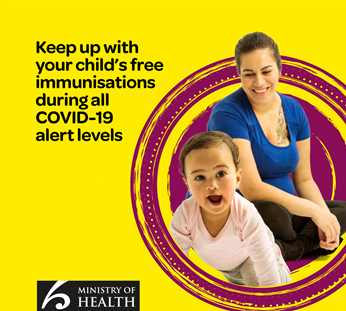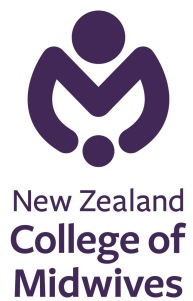COVID-19 & Pregnancy
COVID-19 & Pregnancy
COVID-19 is now established in New Zealand so there is always a chance of being exposed. If you are pregnant, find out what you can do to help keep you and your baby safe and what to expect from your maternity carers.
Key points about COVID-19 and pregnancy
- recent evidence shows that pregnancy may increase the risk of developing severe symptoms of COVID-19, which can lead to complications with pregnancy
- the evidence also shows that COVID-19 immunisation during pregnancy is very effective at preventing severe symptoms
- it is rare for pregnant women to end up in hospital with severe COVID-19 symptoms if they've had COVID-19 vaccine doses and booster/s
- immunisation safely and effectively reduces the risk of serious illness or harm to pregnant women from COVID-19 infection
Book your COVID-19 immunisation now
If you are pregnant, or planning a pregnancy, it is important to make sure you are up to date with your course of COVID-19 vaccines.
Recent evidence shows that pregnancy may increase the risk of developing severe symptoms of COVID-19, which can lead to complications with pregnancy. Studies have shown that having the COVID-19 vaccine during pregnancy is safe and significantly reduces the risk of serious illness or harm to pregnant women.
If you're pregnant, you can get a COVID-19 vaccine at any stage of your pregnancy. You can book your immunisation now. If you've had a positive COVID-19 test or recent COVID-19 immunisation, you need to wait at least 6 months before having a booster. If you haven't made your appointment yet, you can book online at Book My Vaccine.
You can also:
- ask your GP clinic if they are providing the COVID vaccine
- book by phone - call the COVID Vaccination Healthline on 0800 28 29 26 (8am to 8pm, 7 days a week)
Data from the large number of pregnant people worldwide who have already had their COVID-19 immunisation shows that there are no extra safety concerns with giving COVID-19 vaccines during pregnancy.
Immunising during pregnancy may also help protect your pēpi. There is evidence that infants can get antibodies to the virus through cord blood and breastmilk.
If you have any questions or concerns, talk about them with your healthcare professional.
See the KidsHealth page about the COVID-19 vaccine and pregnancy for more information
Remember to have other important vaccines during pregnancy
As well as having the COVID-19 vaccine, remember to also have the flu vaccine and whooping cough vaccine.
You can have the flu vaccine and COVID-19 vaccine at any stage of pregnancy.
The whooping cough vaccine is most effective when given from 16 to 26 weeks of pregnancy, but it's available and free from 13 weeks of every pregnancy.
You can have the vaccines at the same time or separately.
See the Immunise website by Te Whatu Ora for more information on immunisation and pregnancy.
How can I reduce the risk of getting COVID-19 if I'm pregnant?
As well as immunisation against COVID-19, there are other ways to protect yourself.
Find out how to protect yourself and others against COVID-19
You can find out about Paid Parental Leave from the Employment New Zealand website.
Find out about Paid Parental Leave
If I'm pregnant and have COVID-19, can I pass it on to my baby during pregnancy or birth?
The evidence shows that it is rare for pregnant women to pass on COVID-19 to their babies during pregnancy or birth (called 'vertical transmission').
If I'm pregnant and have COVID-19, how might it affect my baby?
For pregnant women with COVID-19, the evidence so far indicates:
- there is no increased risk of miscarriage
For some variants of COVID-19, complications for newborn babies may include:
- a slightly increased risk of being born prematurely (before 37 weeks of pregnancy)
- an increased risk of stillbirth
COVID-19 immunisation during pregnancy reduces these risks by reducing the chance of infection in the baby's mother and reducing the severity of infection if the mother does get COVID-19.
You can see more information about COVID-19 vaccination in pregnancy at the NZ College of Midwives website.
See the NZ College of Midwives website
Watch this video to find out more about what to expect if you're pregnant and have COVID-19
Will the COVID-19 pandemic affect my pregnancy care?
All maternity facilities are open to provide services. If you are due to give birth, talk with your midwife about your pregnancy wellbeing and the visiting policy at your local maternity facility. Your midwife, or midwifery practice, has adjusted the way they work to reduce the spread of COVID-19. Your health and wellbeing are very important, and clinical support remains available to you.
Before any visit with your midwife, you need to confirm that you are well. If you are unwell with COVID-19 or any other infection, your midwife or midwifery service will arrange a way to provide you with services.
If you have COVID-19, your midwife may postpone your visit. Or, the visit may happen by phone or video call. If the visit is urgent it will still take place, but your midwife will ask you and others with you to wear a medical face mask. Your midwife will provide you with this. Your midwife will also wear personal protective equipment.
It is important to tell your midwife if you have any symptoms, or COVID-19 contacts in your household. She can make sure she takes measures to prevent possible transmission and to support you with your health. You will still receive the care you need.
What if I develop symptoms of COVID-19?
If you develop symptoms of COVID-19, take a RAT test or call Healthline on 0800 358 5453 and follow their advice. Contact your midwife (or GP or obstetrician) if you are unwell.
What if I am pregnant and a household contact of someone with COVID?
Take a rapid antigen test daily for 5 days before going out anywhere. If you are due to see your midwife, tell your midwife or midwifery practice before the appointment, especially if it is a home visit.
What should I do if I'm pregnant and have a COVID-19 diagnosis?
If you have been diagnosed with COVID-19, you will receive the support you need. Your health and wellbeing are very important, and clinical support will remain available to you.
Tell your midwife or midwifery practice.
Check the Unite Against COVID-19 website for advice about what to do if you have COVID-19
Check out the KidsHealth page on COVID-19 and breastfeeding for more information
Find out more on KidsHealth about caring for a newborn when you have COVID-19
Resources for taking care of your mental health
It is important to take care of yourself, and that means taking care of your mental health as well as your physical health.
Take a look at some resources that may be helpful:
Check mental health and wellbeing resources at the Unite Against COVID-19 website
See the mental health and wellbeing resources and COVID-19 support at Depression.org.nz
Should my baby have their first immunisation at 6 weeks?
Yes. Immunising your pēpi on time is important to protect them from infections such as whooping cough and measles.
Find out about immunising children during COVID-19

The content on this page is supported by Te Kāreti o ngā Kaiwhakawhānau ki Aotearoa | The New Zealand College of Midwives.

This page last reviewed 18 May 2023.
Do you have any feedback for KidsHealth?
If you have any feedback about the KidsHealth website, or have a suggestion for new content, please get in touch with us.
Email us now